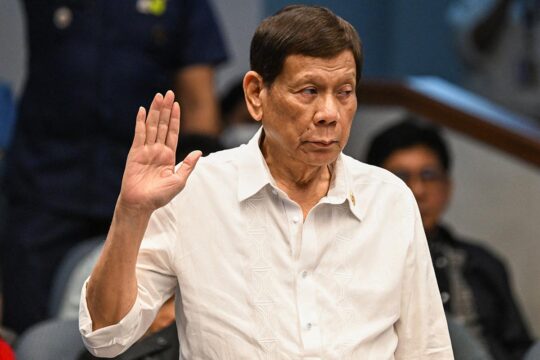Peruvians began three days of national mourning Thursday for polarizing former president Alberto Fujimori, who ruled his country with an iron fist and then spent 16 years in prison for crimes against humanity.
Fujimori, who died on Wednesday aged 86 after a long battle with cancer, lay in state at the national museum where hundreds of supporters lined up to pay their respects at his open casket.
He was loved by many for crushing leftist guerrillas and shoring up the economy, but reviled by others who saw him as a power-hungry autocrat guilty of brutal human rights abuses.
"He is the best president Peru has ever had," Isabel Perez, a 56-year-old nurse, said outside Fujimori's house, where supporters gathered earlier in the day to see his coffin carried out.
"He was an authoritarian," said passerby Elizabeth Martinez, 61.
Congress held a minute of silence in honor of Fujimori, whose state funeral will take place on Saturday.
Fujimori, who led Peru from 1990 to 2000, was released from prison on humanitarian grounds in December while serving a 25-year sentence for crimes against humanity during his rule.
His fierce military campaign against Shining Path and Tupac Amaru leftist rebels was credited with bringing peace to Peru, but brutal tactics by military death squads would later lead to his imprisonment.
The conflict left more than 69,000 people dead and 21,000 missing from 1980 to 2000, most of them civilians, according to a government truth commission.
Sources close to his family told AFP Wednesday that Fujimori's health had deteriorated rapidly after he completed treatment for tongue cancer in August.
- Divisive legacy -
Fujimori was last seen in public last Thursday as he was leaving a Lima clinic where he said he had undergone a CT scan.
"After a long battle with cancer, our father, Alberto Fujimori, has just departed to meet the Lord," his children Keiko, Hiro, Sachie and Kenji Fujimori wrote in a joint statement on X.
The government said Fujimori would have "the funeral honors that correspond to a president in office."
Despite his legal woes, Fujimori remained influential in Peruvian politics.
His daughter Keiko -- who has made three failed bids for the presidency -- announced in July that her father would run for president again in 2026.
As news of his death spread quickly on social media, supporters and detractors quarreled over his legacy.
Fujimori was convicted and sent to prison in 2009 over massacres committed by army death squads in 1991 and 1992 in which 25 people, including a child, were killed in what he presented as anti-terrorist operations.
In December 2017, then-president Pedro Pablo Kuczynski pardoned Fujimori due to his ill health.
But the Supreme Court later annulled the pardon and, in January 2019, he was returned to jail from hospital.
He was released again in December 2023 after a court reinstated his pardon.
- Hostage crisis -
The son of Japanese immigrants, Fujimori said he had paved the way for Peru to become one of the leading countries of Latin America.
But critics accused him of making up his own rules and riding roughshod over the country's institutions.
As he turned 80 in 2018, Fujimori told AFP: "Let history judge what I got right and what I got wrong."
One of the most dramatic episodes of his presidency was a four-month hostage ordeal at the Japanese embassy in Lima in late 1996 and early 1997.
The standoff ended with Fujimori sending in commandos who rescued nearly all 72 hostages and killed 14 leftist rebels.
Japan's top government spokesman, Yoshimasa Hayashi, said Thursday that Japan "will never forget the efforts made by former President Fujimori" in helping to get the hostages released.
But he also acknowledged that there were "a variety of evaluations" of Fujimori, including "the fact that he was convicted of human rights violations during his term in office and served in prison."
Fujimori left office when he became engulfed in a major corruption scandal and went into self-imposed exile in Japan.
He memorably faxed in his resignation but was arrested years later in Chile and sent back to Peru for trial.


